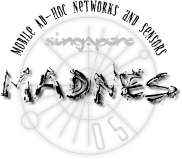|
|
| important dates & deadlines |
| 2005.05.02 |
paper submission deadline |
| 2005.05.09 |
new submission deadline |
| 2005.06.06 |
accepted author notification |
| 2005.07.15 |
all papers updated |
| 2005.09.05 |
author registration deadline |
| 2005.09.20-22 |
workshop dates in Singapore |
| 2005.11.12 |
camera-ready copy deadline |
|
 |
Click on the box to the left to download a PDF version of this document. |
The MADNES’05 workshop will be held in conjunction with the ISC’05 conference in Singapore, co-sponsored by the SAIT Laboratory and the U.S. Army Research Office. Workshop dates are scheduled for September 20-22, 2005.
topics
The MADNES workshop accepts original research papers on all security aspects of constrained network environments. Topics of interest include, but are not limited to, the following aspects of mobile ad-hoc networks (MANETS), mobile agents, sensor networks and radio frequency (RF) devices :
- Security and fault tolerance
- Privacy issues
- Security & privacy applications of mobile agents and intelligent autonomous systems
- Distributed denial of service attacks and defenses
- Mobile code security and verification
- Key management and trust infrastructures
- Security, privacy and efficiency trade-offs
- Secure distributed algorithms
- Secure & private protocols for dynamic group applications
|
- Secure location, discovery and authentication of neighbors
- Secure timing and synchronization
- Secure/private data collection and aggregation
- Secure self-configuration
- Secure routing
- Analysis and simulation of security and privacy properties
- Case Studies
- Energy efficient cryptography
|
material proceedings
The proceedings will be published by Springer-Verlag in its series of Lecture Notes in Computer Science. Each contribution will be reviewed as a regular submission.
paper submissions
electronic submission
All papers must be submitted electronically by the new deadline of May 9, 2005 @ 5.00pm EDT. In order to submit a paper, authors need to have an existing EDAS account or to create a new (free) account at edas.info. Papers in PDF format can be uploaded using the web interface at the EDAS website. Submission of your paper will be acknowledged by e-mail. If you have any further questions about submission procedures please contact Breno de Medeiros.
instructions for authors
Submissions must not substantially duplicate work that have been published or that are simultaneously submitted to a journal or a conference/workshop with proceedings. Each paper should begin with a title, a short abstract, and a list of keywords. Papers should be in Portable Document Format (.pdf), at most 12 pages excluding bibliography and appendices, and at most 16 pages total using at least 11-point fonts and with reasonable margins. Committee members are not required to read appendices; the paper should be intelligible without them. Submissions not meeting these guidelines risk rejection without consideration of their merits. It is strongly preferred that submissions be processed in LaTeX according to the instructions at http://www.springer.de/ comp/lncs/authors.html, since this will be a mandatory requirement for the final version of papers. Authors of an accepted paper must guarantee that at least one of the authors will attend the workshop and present their paper.
staff & committee members
General Chairs
- Feng Bao (Institute for Infocomm Research, Singapore)
- Breno de Medeiros (Florida State University, USA)
Program Chairs
- Mike Burmester (Florida State University, USA)
- Alec Yasinsac (Florida State University, USA)
Program Committee
- N. Asokan (Nokia Research Center, Finland)
- Giuseppe Ateniese (Johns Hopkins University, USA)
- Feng Bao (i2r, Singapore)
- John Baras (University of Maryland, USA)
- Sonja Buchegger (EPFL LCA, Switzerland)
- Levente Buttyan (Budapest University of Technology and Economics, Hungary)
- Stephen Carter (Raytheon Corporation, USA)
- Claude Castelluccia (INRIA, France)
- Bruce Christianson (University of Hertfordshire, UK)
- Jim Davis (Iowa State University, USA)
- Breno de Medeiros (Florida State University)
- David Evans (University of Virginia, USA)
- Virgil Gligor (University of Maryland, USA)
- Zygmunt Haas (Cornell University, USA)
- Fritz Hohl (Sony WSL, Germany)
- Markus Jakobsson (University of Indiana Bloomington, USA)
- Kwanjo Kim (Information & Communications Univ, Korea)
- Panayiotis Kotzanikolaou (University of Piraeus, Greece)
- Evangelos Kranakis (Carleton University, Canada)
- Tri Le-Van (Florida State University)
- Javier Lopez (University Of Malaga, Spain)
- Chris Mitchell (Royal Holloway University of London, UK)
- Rene Peralta (Yale University, USA)
- Avi Rubin (Johns Hopkins University, USA)
- Christian Tschudin (UNIBAS, Switzerland)
- Tsutomu Matsumoto (Yokohama National University, Japan)
- Giovanni Vigna (University of California at Santa Barbara, USA)
- Cliff Wang (Army Research Office, USA)
- Andre Weimerskirch (University of Bochum, Germany)
- Susanne Wetzel (Stevens Institute of Technology, USA)
- Moti Yung (Columbia University, USA)
- Yuliang Zheng (University of North Carolina, Charlotte, USA)
For more information, please contact our staff via email.
|
|




